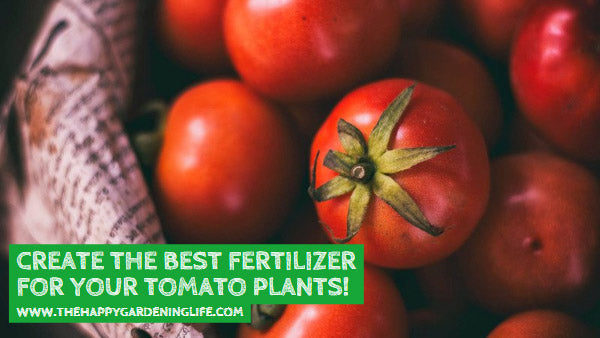
Create the Best Fertilizer for Your Tomato Plants!
Share
 When it comes vegetable garden staples, tomatoes are undoubtedly a favorite in home gardens around the world. A garden is never really quite complete without these delicious goodies, and they bring such joy when it’s finally time to harvest them. But sometimes no matter what you do, they just don’t produce as much as you want them to. What could be the problem?
When it comes vegetable garden staples, tomatoes are undoubtedly a favorite in home gardens around the world. A garden is never really quite complete without these delicious goodies, and they bring such joy when it’s finally time to harvest them. But sometimes no matter what you do, they just don’t produce as much as you want them to. What could be the problem?
The answer probably lies in the fertilizer you used. Growing tomatoes is easy but the plants need certain nutrients in order to produce quality crops with excellent yields. If you provide the right nutrients from the start, then you can expect productive results from your beloved tomato plants.
To help other gardeners discover the most effective fertilizer for tomatoes, the team at LoyalGardener.com has kindly shared with us their comprehensive guide to making the best homemade tomato fertilizer. Be sure to check out their tips below for more information!
What is the Best Fertilizer for Tomatoes?
The main mineral tomatoes need is potassium. Apart from it, a good tomato fertilizer should also contain nitrogen, calcium, sulfur, phosphorus, and magnesium.
If you grow tomatoes in outdoors, keep in mind that all the minerals listed above are important for the healthy development of the plant. This means that a soil analysis should also determine if you need to compensate for any deficiencies of the named minerals.
Apart from these minerals, considered macro nutrients, the tomato plants also need a series of micro nutrients or growth activators, namely zinc, iron, and copper. Most of the times, a deficiency of these micronutrients is only felt in the early stages of growth, while a mature tomato plant will not suffer much from the lack of these elements.
The plants assimilate the nutrients through their root system, but a fertilizer cannot be effective unless the plant is well irrigated. In fact, tomato plants can only absorb the nutrients present in the soil through water and if you want to maximize yield you should keep both the nutrients and the irrigation under control.
About irrigation, it should be said that both irrigation scarcity and excess water have negative consequences on the development of the plant. Tomatoes do not require huge amounts of water to thrive, but irrigation should be constant.
Another thing to consider before using fertilizer is the right rotation of the crops in the garden. Without proper rotation, the soil tends to deplete and in this context the use of tomato-specific fertilizer is precious.
On the market, there are numerous types of fertilizers to use yet not all of them are as good as they claim.
My suggestion is to create your own fertilizer at home by mixing the right quantities of minerals. Personally, I make my own fertilizer which I use on a wide number of cultivars, such as oxen heart, cherry tomatoes, and yellow tomatoes.
In detail, the fertilizer I make contains:
- Nitrogen (8%)
- Phosphorus (5%)
- Potassium (6%)
- Calcium (15%)
- Manganese (5%)
- Magnesium (6.5%)
All these elements are easy to find either online or at a local nursery and it is really easy to find minerals of natural origin that are safe to use if you want to grow biological veggies.
If you don’t feel like mixing the minerals yourself, many fertilizers on the market contain these minerals in the specified quantities, although their provenience is not proven in the vast majority of the cases. On the other hand, if your soil is richer or poorer in one of the minerals, you can easily adjust the quantities to meet your needs if you choose to prepare your own mix.
The best fertilizer for tomatoes is easy to make yet you can always buy a commercial formula if you don’t feel like making your own. Make an analysis of your soil, see what nutrients your tomatoes lack and act accordingly to increase your yield and obtain juicy and tasty tomatoes that everyone will love to eat!
Read the full article here: LoyalGardener.com
